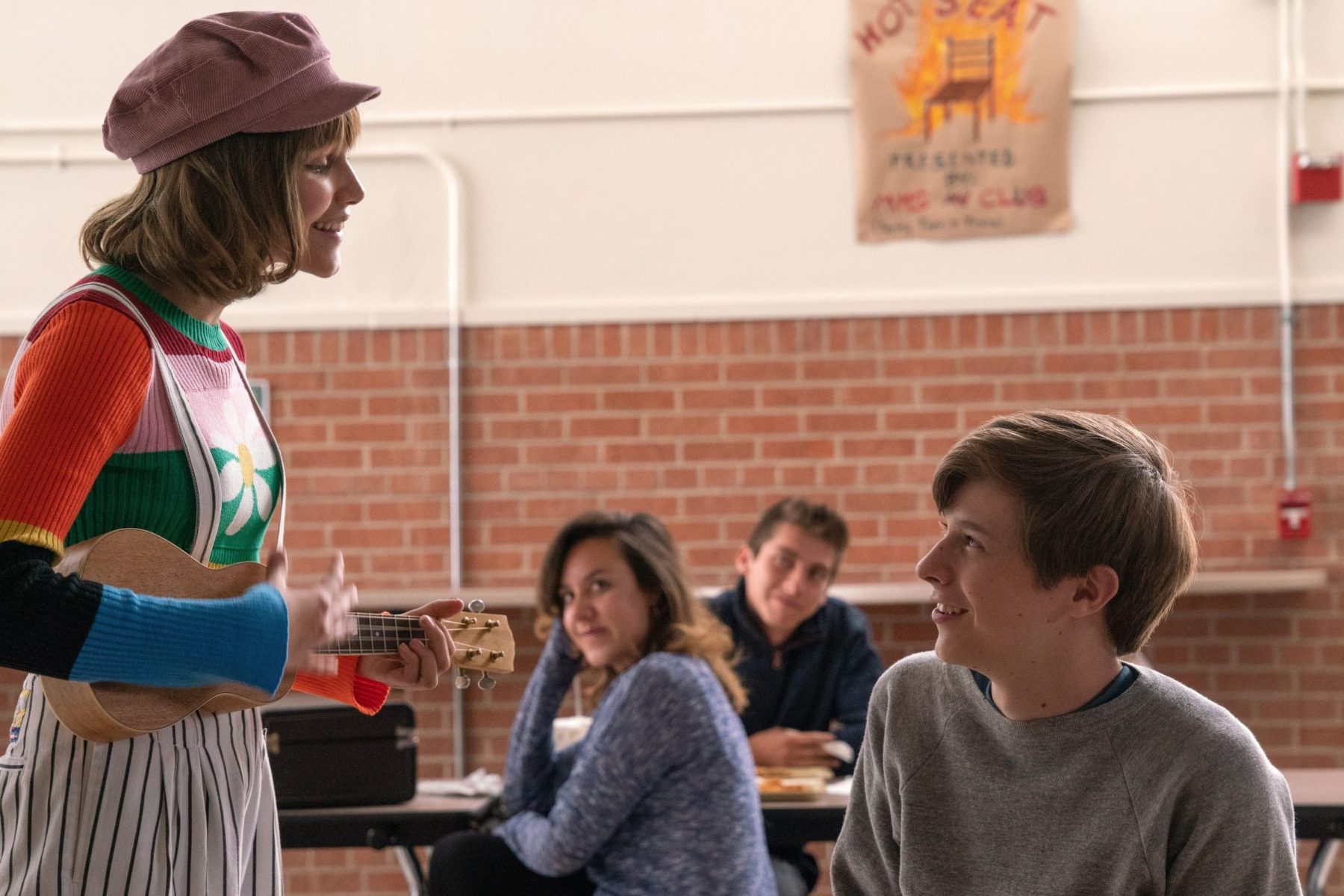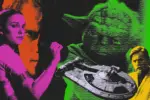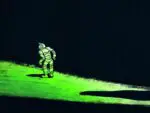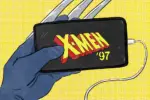The movie adaptation of Jerry Spinelli’s book “Stargirl” tries to encourage adolescents to embrace their uniqueness but ultimately comes up short. Part romance and part coming-of-age tale, the golden-hued film narrates the growing relationship between a quiet boy and an eccentric new girl — but the extremes that pepper the movie make for a plot that leans more toward fantasy than reality.
Although the movie seemingly aims at inspiring viewers to be more like the female protagonist, Stargirl — that is, to embrace kindness and their unique interests — her seemingly flawless personality is just a little too obscure to be attainable. When the credits roll, viewers will emerge from their couches with a lot of warm, fuzzy feelings and a vague whiff of inspiration. If the film had given its audience better insight into Stargirl’s point of view to make her seem less perfect and more human, viewers might have related to her more, and the message of confidence and self-acceptance would have come across better.
Initially, “Stargirl” seems to be a cute, boy-meets-girl story. Right off the bat, the film introduces us to Leo, a quiet high school student who lives in the uneventful, small town of Mica, Arizona. Ever since being bullied for his affinity for quirky ties as a kid, he has made it his goal to blend in — a coming-of-age movie couldn’t have a better candidate.
Enter Stargirl: the free-spirited, ukulele-sporting new girl who never runs out of smiles and random acts of kindness. If this movie is about figuring out who you are, Stargirl’s the model of self-assurance. She even sings “Happy Birthday” to Leo in the middle of the cafeteria on her first day. He’s smitten. Once he finally works up the nerve to talk to her, their romance takes a running start. Before long, they’re hanging out after school, taking afternoon desert strolls and bonding over their passion for ‘70s music. In other words, their relationship is basically the “perfect” teen romance.
The only problem? The relationship is sort of one-sided. So far, Stargirl is the 2020 iteration of the Manic Pixie Dream Girl: a purely imaginary dream girl who exists solely “to teach broodingly soulful young men to embrace life and its infinite mysteries and adventures.” Critics have long hoped to put this tired trope to rest, but many of the same dreaded elements threaten to resurface here. Stargirl magically appears to encourage Leo to come out of his shell and embrace the interests that make him unique. “Since she got here, things have been different,” he says.
Initially, Stargirl wins everyone else’s hearts too. She becomes the school’s unofficial “good luck charm” when her spontaneous halftime ukulele performance spurs the football team to their first win. Soon she’s high-fiving all the popular kids in the hallways and is the star of the cheerleading squad. But the popularity doesn’t last long. After one of the opposing team’s players gets injured, Stargirl sparks an angry uproar from the crowd when she accompanies him to the hospital to make sure he’s okay. When the school loses the game without her, Stargirl’s reputation as the school’s sweetheart is officially shattered. Everyone shuns her except Leo, but before long even he succumbs to the social pressure. In the cringiest moment of the film, he tells Stargirl to just be normal. Stargirl, stunned and hurt, walks away.
Then, to everyone’s surprise, Stargirl shows up to school the next day as Susan (her given name) with straightened hair, no ukulele and dark skinny jeans in place of her usually colorful outfit. She’s taken Leo’s advice. Leo’s psyched, but after only a day of her fake persona, Stargirl realizes she’s better off being authentic to herself and decides to give up the act.
The lapse in Stargirl’s otherwise unwavering eccentricity seems like Disney‘s attempt to transcend the wearisome Manic Pixie Dream Girl movie type. Up to this point, Stargirl has been more of a stereotype than a person, unswervingly kind and oblivious to what others think of her. This is the closest the movie gets to revealing any kind of vulnerability or sensitivity to others’ opinions.
Sadly though, this uncharacteristic slip-up isn’t explored in depth. Stargirl is given limited time to discuss what happened; she gives a speech on originality and talks briefly with Leo about it, but viewers don’t hear much more. On the whole, the stint of self-doubt is but a fleeting moment: Stargirl shows up as herself again the next day. For the rest of the movie, she remains her quirky self, just more distant to Leo and viewers.
This phase and Leo’s reaction prove just how little he understands Stargirl — and subsequently, how little of Stargirl’s full personality is revealed to the viewer, since she is presented almost exclusively from Leo’s perspective. Viewers don’t see Stargirl’s reaction when she’s at home alone, nor hear her thoughts. This phenomenon is reminiscent of Marc Webb’s 2009 hit, “(500) Days of Summer,” in which the female lead is only portrayed through the perspective of the man who loves her.
According to one critic, this device can be a creative way to “highlight the feeling that we can’t really know another person.” Stargirl does indicate that she won’t just be whatever Leo wants her to be, showing that she’s her own person and does have an identity apart from him. However, besides this one instance, no indications of Stargirl’s other aspirations or interests are given. Just when her character undergoes a bit of conflict, the movie moves on and removes her from the narrative.
The last time audiences see Stargirl is at the Homecoming dance. Stargirl surprises Leo with one more act of charity: She sets him up to sing his favorite song on stage, so he can share his talent with others. Then she vanishes, and Leo never sees her again. Although the movie has somewhat developed her and Leo over time by having them both inch toward a more relatable middle ground, snatching Stargirl from the plot shuts the door on these more intriguing sides of the characters.
When all’s said and done, Stargirl’s disappearance speaks just as loudly as her presence throughout the movie. Her mysteriousness during the film and abrupt disappearance at the end make her seem less human and more like a fairy tale. Even the students and Leo himself begin to wonder if she was just a figment of their imaginations. Her commitment to her own identity was already so extraordinary as to border on unrealistic, so her disappearance makes her resemble a fleeting breeze more than a girl.
Viewers and the students are left to wonder whether such undiluted eccentricity can really survive in the real world — an uncertain conclusion at best. Since she’s so unfailingly charming and magical, teens are likely to find timid Leo more relatable. If they can’t identify with the heroine, they’re left to sigh at her departure and try to embody a sliver of her charisma as they move on with their lives.
Although she became flesh and blood in a moment of weakness, Stargirl leaves the movie as a Manic Pixie Dream Girl. At one point, Leo’s mentor says, “You think things have to be real or magic … but the best things are both.” The idea of hoping for an extraordinary life experience is nice, but it’s unrealistic to place that expectation on someone else.
Perhaps if either or both main characters were further developed and had more to them than single prominent character traits, the movie would have left audiences with something a bit more graspable and actionable. But a fairy-tale extreme of two polar opposites crossing paths for a fleeting moment? The cliché is far too unrealistic to actually be inspiring. Although the movie attempts to make Leo and Stargirl relatable, the vast gap in their maturity pushes both characters just out of the viewer’s reach. In the end, the film holds little for teens to identify with, root for or grow alongside.
“Stargirl” had potential, but teens would do well to keep searching for movies that teach them to love others “for the complicated, messy, decidedly non-ethereal people they are” rather than pining for the perfect person of their dreams.

















